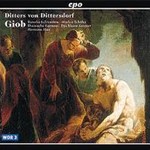
Giob (Complete oratorio)
 $63.00
Out of Stock
$63.00
Out of Stock6+ weeks add to cart
DITTERSDORF
Giob (Complete oratorio)
Markus Schafer, Romelia Lichtenstein, Jorg Waschinski, Ekkehard Abele / Rheinische Kantorei / Das Kleine Konzert / Hermann Max
[ CPO / 2 CD ]
Release Date: Saturday 1 August 2009
This item is currently out of stock. It may take 6 or more weeks to obtain from when you place your order as this is a specialist product.
Dittersdorf's setting of the Old Testament book of Job was first performed in 1786. The libretto takes a fair amount of artistic license, but some of the fiction fleshes out the biblical tale effectively.
Carl Ditters von Dittersdorf (1739-1799) was a remarkably talented contributor to the golden age of Viennese Classicism, but today his name is only familiar due to footnotes and passing references in immaculately researched volumes dedicated to his most prominent contemporaries. In contrast to Haydn and Mozart, Dittersdorf was born and bred in Vienna but moved out to the provinces in pursuit of musical positions at various courts. Yet his music was also popular in his native city, particularly a series of Italian oratorios composed for the Tonkünstler-Sozietät, a society devoted to raising funds for needy musicians.
Dittersdorf's setting of the Old Testament book of Job was first performed in 1786. The libretto takes a fair amount of artistic license, but some of the fiction fleshes out the biblical tale effectively. The oratorio charts Job's progression from contentment to philosophical enlightenment due to a sequence of horrific afflictions. In this version of the story we meet Job's wife Zara, who is less able to retain her faith in God during their tribulations; many of the oratorio's best arias concern her struggle to reconcile adversity with divinity.
Dittersdorf's score is magnificent, featuring a violent storm scene with a chorus that makes Mozart's similar scene in Idomeneo look like just a bit of wind, flashy soprano roles to rival the Queen of the Night, and arias that convey an ample diversity of extrovert emotional responses. There are many highlights, most notably Zara's lamentation mixed with anger upon discovering that her children are dead and the grand quasi-Handelian chorus that crowns the oratorio.
Emperor Joseph II is alleged to have approached Dittersdorf not long after the Vienna premiere and talked to him at some length, saying "Your oratorio Job pleased me extraordinarily well, and I have had a copy of the score made for me. You don't have anything against that, I'm sure." The oratorio was also heard in Berlin a few years after the Vienna premiere, and Dittersdorf wrote that on this occasion Giob was performed by 232 musicians. However, in the last 200 years the oratorio has remained consigned to history books, and now Hermann Max and the CPO label have taken a massive step to rectify our ignorance. The soloists are never less than secure, with Schäfer and Lichtenstein particularly impressive in the two leading roles, and the orchestra and choir are particularly excellent.
Max presents a strong case for further investigation of the lesser-known composers of the Age of Reason. It is fascinating to hear a top-quality performance of a major work originally premiered in Vienna only a few months prior to Le nozze di Figaro; it is also gratifying to hear a large-scale biblical oratorio between Handel's Jephtha and Haydn's Die Schöpfung - something of rarity even without the added attraction of such wonderful music. Giob may not quite capture all the frailties of the human heart like the mature Mozart does, nor display the sunny disposition and deceptive genius of Haydn, but Dittersdorf's score has enough music of comparable quality to interest to anyone who cares about those masters' musical dramas.



